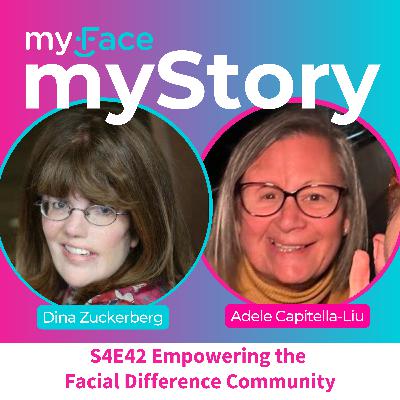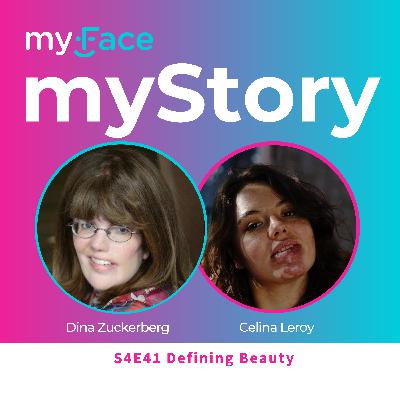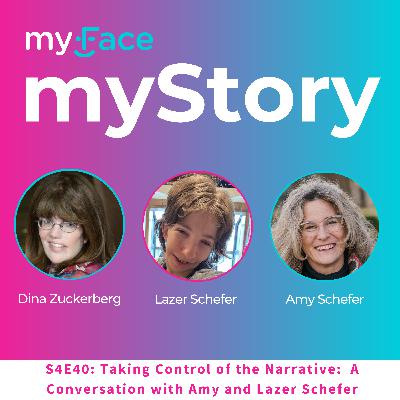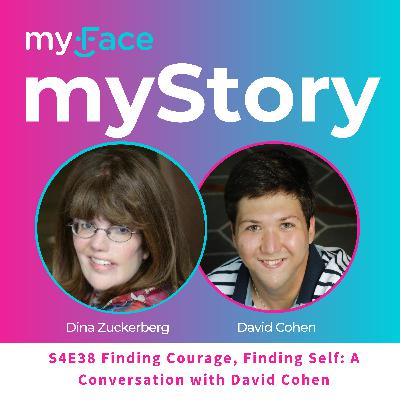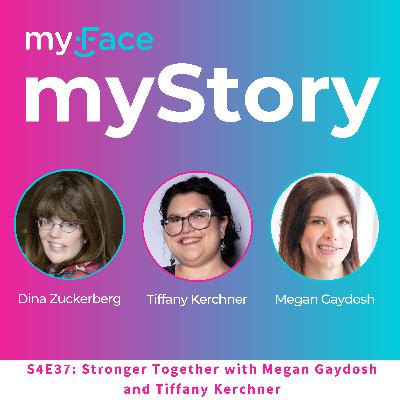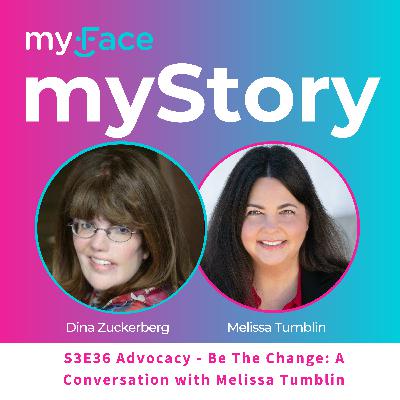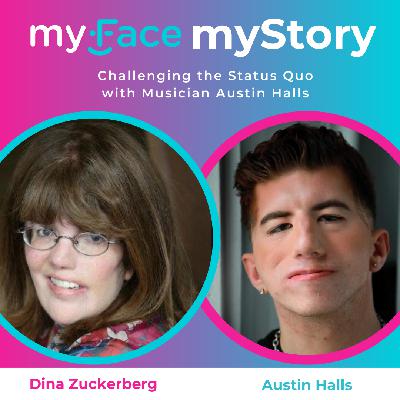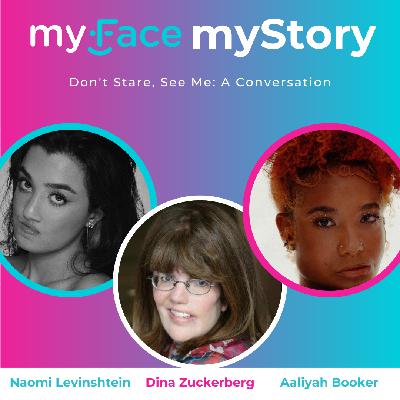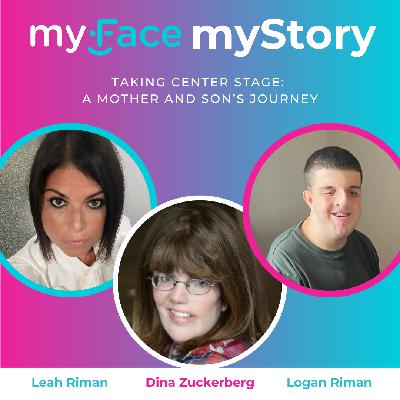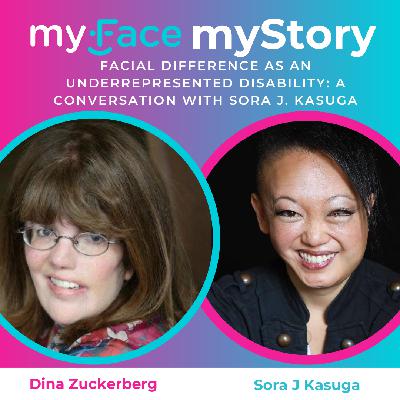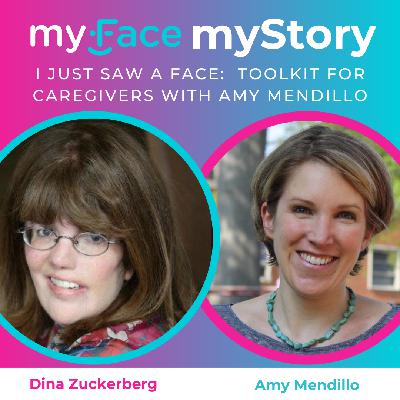Hiding Behind a Mask: A Conversation with Mary Avella
Description
On this month's myFace, myStory podcast, host Dina Zuckerberg is joined by Mary Avella, born with Crouzon Syndrome. They will discuss how those with facial difference can hide their true selves wearing both figurative and/or literal masks, even creating a personality. What happens when you remove those masks and reveal who you are underneath?
- [Announcer] Welcome to "My Face My Story, Voices From the Craniofacial Community," with your host, Dina Zuckerberg.
- Hello and welcome to "My Face My Story, Voices From the Craniofacial Community." Whether you're watching on YouTube or listening on Apple podcasts, quick subscribe now so that you'll never miss a future episode. And if you're a fan of "My Face My Story," rate and review the program on Apple Podcast so that we can get our message of inclusivity and empowerment to more people. I'm your host, Dina Zuckerberg, the director of family programs at My Face. I was born with a cleft lip, a hearing loss, and no vision in my left eye. "My Face My Story" is about people like us being seen and heard, about sharing stories within the cranial facial community and with others. Today I will be joined by Mary Avella. Mary was born with Crouzon Syndrome and she has had 30 surgeries. She is a student at Hunter College where she is majoring in psychology, neuroscience, and aspires to be a neuroscientist. She is passionate about advocacy for the disabled community and has been a member of the My Face family for a long time. She is also passionate about reading. Welcome Mary, I really look forward to our conversation.
- Thank you so much for having me. I'm so excited to be here.
- Great. So Mary, can you share with the audience about your facial difference and describe your difference for those who may not know what it is?
- Absolutely. Crouzon Syndrome is where the seams of the skull are not fused properly, and one the main symptoms is that growth in the middle of the face is decreased.
- And what was your childhood like for you growing up?
- That's a very good question. I mean, I do have plenty of good memories, but I have just as many bad. I mean, surgery was, I had my surgeries very young in childhood, so they were all very traumatic for me. And again, that was half my childhood. So it definitely was not easy. I was also very different from all the other kids at school. I was the only one that looked like me. I was in special ed class, one of the special ed classes. I had a nurse. At some points later, I had a para, so it was definitely an abnormal childhood.
- So what drew you to psychology neuroscience? And why do you wanna be a neuroscientist?
- Well, it is a very complicated answer. I was trying out a few different majors and I really didn't find the right fit. I was math, I was English, which is like total opposites, and I really didn't know what I wanted to do. And then I've been going to therapy since I was five. So I had like, I had an inside piece to that world of psychology. So I've been a part of it for so long. So I figured, let me just try this, and I took my first introduction to psychology class in 2022 and I absolutely loved it. I wanted to help people like me who have facial differences and who have autism. I'm on the autism spectrum, and I wanted to just help people because a lot of people don't have both autism and a facial difference. And it's even rare just to have a facial difference. So I wanted to, as I said, just help people. But then I realized maybe being a therapist wasn't for me, that was the initial path I wanted to go, and I figured, well, I still wanna help people, but I wanna do the research behind that. That's how I can still help people. And all that is neuroscience.
- Yeah, and I think we can use more researchers, especially in the craniofacial space. So that's great. So during the pandemic, we were all literally wearing masks, but I think many of us figuratively wear masks, especially for those of us with craniofacial differences. And you and I have talked a little bit about this. Why do you think we figuratively wear a mask?
- Well, it's actually, I'm studying this with psychology, everybody does it to a point. We all have different aspects of ourselves. Like for me, I have work, Mary, I have school, Mary, I have family, Mary, it's, everybody does this. It's how we function through the world. But some people put on different aspects of their selves a lot more, or they try and hide who they are a lot more. I think that some of us wear figurative masks more than others because society has taught us that we're not good enough and we're very ashamed of who we are. So we feel like we have to be somebody different.
- It's almost like creating a different persona of who we are.
- Yeah.
- To try to fit into that mold or that experience that we think others want of us, I think.
- Exactly, exactly. We think that, especially from a very young age, we're taught, okay, so if you are this type of person or you're born this way, you're supposed to act this way and you're supposed to fit into this mold, and if you don't, then there's something wrong with you. So then a person will feel like they have to be less of themselves and more of the mold that were taught to be.
- So how does wearing a mask protect you?
- Wearing a mask, now, a bigger reason why I wore a mask was actually, it was more motivated by my autism than my facial difference. But there were so many aspects to this. Wearing a mask helped hide me in the fact that I didn't want people to know that I had autism. And obviously I can't hide the facial difference, but it would just help people like, hey, look at me, I'm a normal person like you are. I just have this very different face. It shouldn't be a problem. So wearing a mask, definitely, I tried to mold myself to be more like other kids in school, other girls, what women are supposed to be. So I definitely tried to do that. And for a long time it did hide me, it hid me well. And also masks definitely hide our deep, inner emotions. So a lot of the pain that I was going through was hidden by trying to be like everybody else.
- Yeah, it's like I didn't want people to see that side of me. So I created this whole other person so that I could appear this way when maybe I was still feeling that way. But it allows you to do that, when you wear a mask in some ways. So during the pandemic, do you think there was a normalizing or leveling of the playing field when we were all wearing masks?
- 1000%. That was one thing that I noticed right away. I've been stared at since I was five years old because of how I look. And it's especially because again, Crouzon Syndrome, it affects the middle of the face. Half of the middle of our faces were covered by masks. So if you're just seeing me from like halfway up the nose up, it's very, it hides a lot of the parts that were very different. So I mean, my eyes are not the same size. My nose is a little pinched on the very top. So that part was seen, but like the difference in my jaw or, which has been fixed, but the difference in my jaw or my lips already been, or maybe like how much bigger the lower part of my nose is compared to the upper part, were all covered, and I noticed a lot less staring.
- Right. And were there any challenges for you in wearing the mask?
- Yes, because of Crouzons, I'm primarily a mouth breather. It's very hard for me to breathe through my nose. I have to like, like people do it naturally. I have to like, okay, I'm breathing through my nose now. I have to like prepare my body. So if you have a mask covering, that's like right on top of your mouth, that makes it very hard to breathe. Most masks I couldn't wear because every like two minutes I'd have to take it off and engulf so much air through my mouth. I had to wear more flexible ones or maybe made out of more stretchy material. Like I could not wear blue hospital masks. I could not breath in the those, it was very hard. But I had to wear these specific black, like stretchy masks that were right on top of me. They had more of like a gap in between the mask and my mouth.
- Right, I found also, because I'm also a mouth breather, that, and I don't know if this was true for others, but I found my glasses were always getting fogged up with the-
- Yeah.
- The mask because I think I breathe so much here, so if it wasn't capturing it all in here. Yeah, so I get it. So what are the consequences of wearing a metaphorical mask? Do you think we can wear a metaphorical mask and be authentic at the same time?
- That is a very gray area question.
- Yeah.
- With wearing a mask, you know, you're performing, you're putting on a part. You can't always perform. Like psychologically, that will wear and tear you and that will do a lot of damage to your mind. And eventually the jig's gonna be up, or eventually you're just gonna get so, I know me personally, you're gonna get so angry at yourself or just so tired of having to play two parts that you're just gonna- one day, and the jig is up. And I feel like you, it's very hard to be authentic. Being authentic and wearing a mask are two opposite things. It's very hard to do two opposite things at the same time. But it's funny that you mentioned this, that you asked this question because there is a quote, I heard it in a TV show, "Disguise is always a self-portrait," and I think there's a lot of truth to that. We incorporate a lot of subtle truths about ourselves in the mask. Like we, maybe the person that we want to be, or like a certain quirk that they have will incorporate that. Or maybe a quirk that we have, as being as our authentic selves, it'll still be in the mask a little bit. Or sometimes the, or sometimes even the mask will be some of our inner emotions that we wanna let out, but we just label it as an





